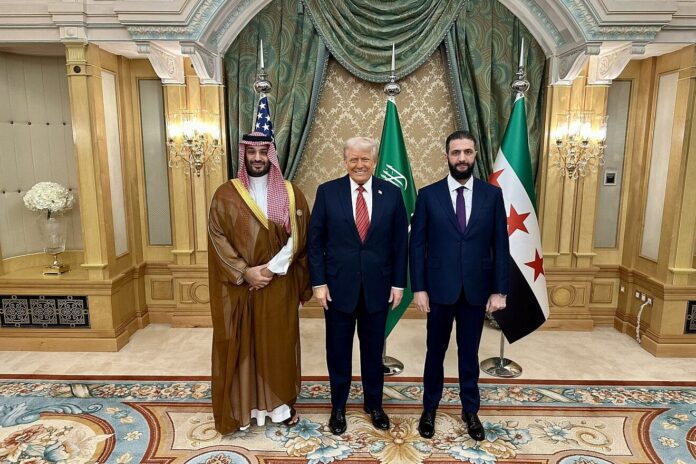President Trump on Wednesday met with Syria’s interim president, Ahmad al-Sharaa, in Saudi Arabia, marking a dramatic shift in global perceptions of the former Islamist fighter who was once tied to al Qaeda and targeted by a U.S. bounty.
Al-Sharaa’s forces led the offensive that captured Damascus and toppled longtime Syrian ruler Bashar al-Assad. He has since established himself as leader of a government promoting itself as inclusive and democratic.
Mr. Trump’s engagement with al-Sharaa — following similar actions by some European leaders — may significantly strengthen Syria’s new government as it seeks to restore relationships with Western nations after years of intense conflict and sanctions.
In a statement, White House Press Secretary Karoline Leavitt said Mr. Trump told the Syrian leader he had “a tremendous opportunity to do something historic in his country,” and encouraged him to join the U.S.-backed Abraham Accords to normalize relations with Israel.
Mr. Trump also urged al-Sharaa to “tell all foreign terrorists to leave Syria; Deport Palestinian terrorists; help the United States to prevent the resurgence of ISIS,” and “assume responsibility for ISIS detention centers in Northeast Syria,” according to Leavitt.
The meeting included Crown Prince Mohammed bin Salman (MBS), Mr. Trump’s host in Saudi Arabia, and Turkish President Recep Tayyip Erdogan via phone.
The meeting followed Trump’s announcement that his administration would lift U.S. sanctions on Syria, saying the move aimed “to give them a chance at greatness.”
“The sanctions were brutal and crippling, and served … an important function, nevertheless, at the time, but now it’s their [Syrians’] time to shine,” Mr. Trump said during his speech in Riyadh. “I say good luck, Syria. Show us something very special.”
Leavitt said “President Erdogan praised President Trump for lifting sanctions on Syria and committed to working alongside Saudi Arabia to encourage peace and prosperity in Syria. The Crown Prince also commended President Trump for his decision to lift the sanctions, calling it courageous.”
Al-Sharaa expressed gratitude to Mr. Trump, MBS, and Erdogan “for their efforts to put together the meeting, and recognized the significant opportunity presented by the Iranians leaving Syria, as well as shared U.S.-Syrian interests in countering terrorism and eliminating chemical weapons.”
The “Iranians” referenced by the White House were reportedly linked to the Assad regime’s allies in Tehran.
“President Al-Sharaa concluded with his hope that Syria would serve as a critical link in facilitating trade between east and west, and invited American companies to invest in Syrian oil and gas,” Leavitt said.
The White House also announced that Secretary of State Marco Rubio would meet with the Syrian foreign minister later this week in Turkey.
Mr. Trump is the first U.S. president since Bill Clinton in 2000 to meet with a Syrian leader, making this a historic diplomatic development. Sharaa, who previously led the group Hayat Tahrir al-Sham (HTS), rose to power quickly after Assad’s collapse. HTS evolved from the al-Qaeda-linked Nusra Front, and Sharaa had also fought U.S. forces in Iraq in the early 2000s.
Until recently, Sharaa was subject to a $10 million U.S. bounty for leading HTS, which remains designated as a terrorist organization by the U.S. Despite Assad’s ouster, longstanding U.S. sanctions continued — until Trump’s recent shift in policy, which is partly aimed at reducing Iranian influence in Syria and across the region.
Saudi Arabia is also rebuilding relations with Sharaa’s government, a move likely meant to counterbalance Iran’s reach in Syria, where Tehran and Moscow had supported Assad during the war.
Israel remains skeptical and has continued conducting airstrikes in Syria, frustrating Sharaa’s leadership.
Senator Lindsey Graham expressed caution, insisting the White House must consult Congress before changing sanctions policy. Graham, who is meeting U.S. and Turkish officials in Turkey, said he could support sanctions relief under the right conditions.
“I am very inclined to support sanctions relief for Syria under the right conditions,” Graham stated. “However, we must remember that the current leadership in Syria achieved its position through force of arms, not through the will of its people.”
He emphasized the importance of working with allies, particularly Israel, before lifting sanctions, adding: “Waiving congressionally passed sanctions is a complicated process… it has to be done in a coordinated fashion with our allies.”
Mr. Trump’s visit to Riyadh was the first stop of a four-day Middle East tour, which will also include Qatar and the United Arab Emirates. While in Saudi Arabia, he addressed a U.S.-Saudi investment summit, where the White House unveiled a $600 billion investment deal, including what it called the “largest defense sales agreement in history.”





